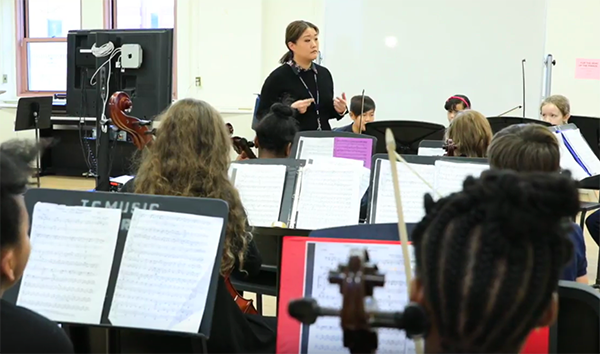Strings Theory
In a spacious studio on the fourth floor of TC’s Horace Mann Hall, doctoral student Tammy Yi leads the TCCS Orchestra through rehearsal of a demanding classical piece called “The Dance of the Tumblers.”
At one point Yi asked the children – fifth and fourth graders – to put down their violins, violas and cellos and simply sing the piece. She calls out directions on when to change tempo or add intensity and passion. After a few minutes, she stops and asks the children about their animals. During a previous practice, the children imagined the piece as a story about wild animals. The violinists labeled themselves penguins; the cellists became elephants; the violas, monkeys.
“So what’s happening with your animals right now?” Yi asks.
“The monkeys stole the nuts,” says one student.
“The elephants fly into the trees to get the monkeys,” says another.
“Then the nuts fall to the ground,” adds a third, “and the penguins and elephants go crazy.”

“Music is a great equalizer. Children who don’t excel in English or math might excel in music, and that proficiency boosts their confidence. The beauty of orchestra is that it teaches them to overcome problems together.”
— Tammy Yi
Yi founded both the TCCS violin program and the Orchestra and is now writing her dissertation on the intersection of social justice and orchestral work. Each time the children arrive at the studio, for example, they sit next to someone new – no exclusionary cliques allowed – and Yi reminds them that to perform cohesively, they must cooperate rather than compete.
“Music is a great equalizer,” she says. “Children who don’t excel in English or math might excel in music, and that proficiency boosts their confidence. The beauty of orchestra is that it teaches them to overcome problems together.”
Two years ago, the TCCS Orchestra placed second in a national orchestral competition, ahead of many ensembles made up of older students wealthier districts.
“We played more challenging pieces than the other orchestras, and we had better violins,” Yi says proudly. “Most traditional schools have music teachers that dictate to students. That’s not how we are taught at Teachers College and that’s not how we instruct students. We never yell or tell students what to do. We guide them and bring out their creativity. That’s why the children at the Community School love music, and that’s why the orchestra is thriving.”
Then, too, after working with Yi, students come away sharing her belief that classical music is “the coolest thing in the world.” Or as one fourth grader puts it during a break in rehearsal: “Music is my passion, and I love Beethoven best.”
Related Articles
Published Friday, Sep 8, 2017